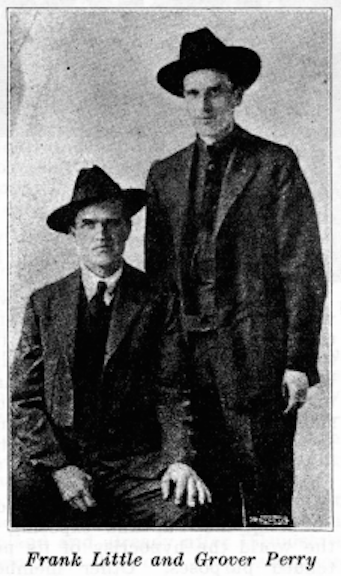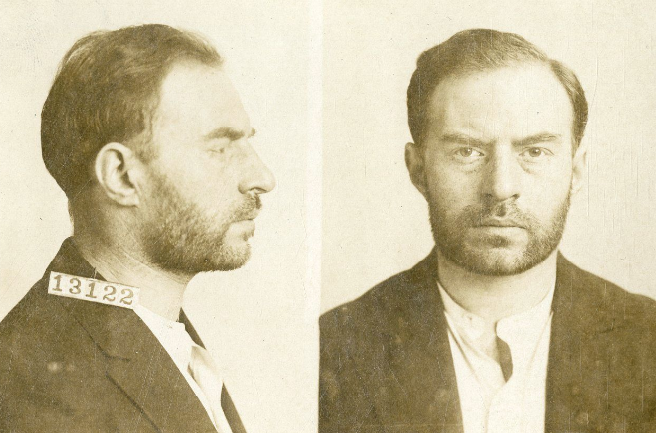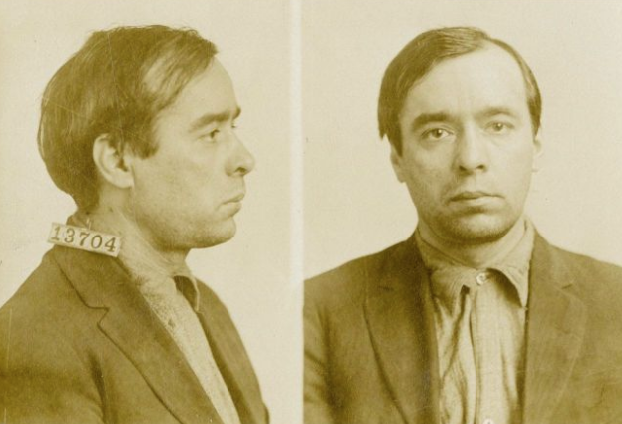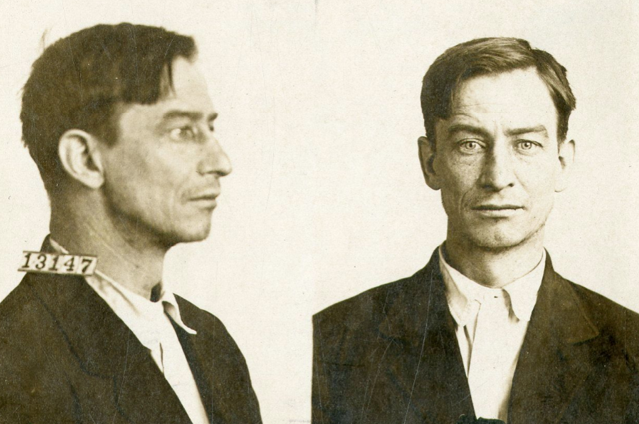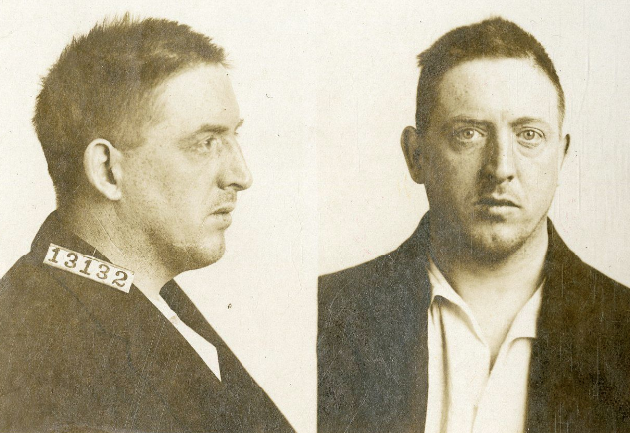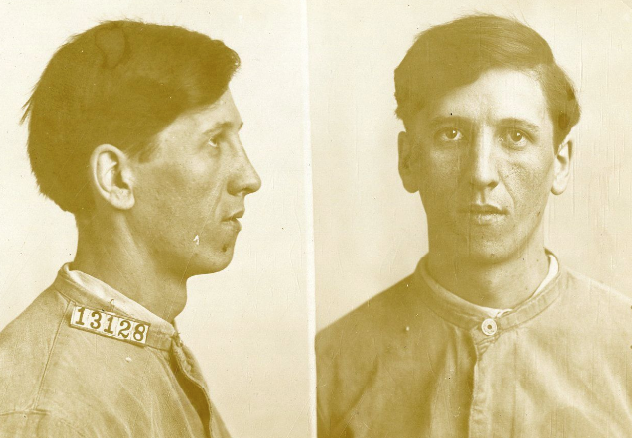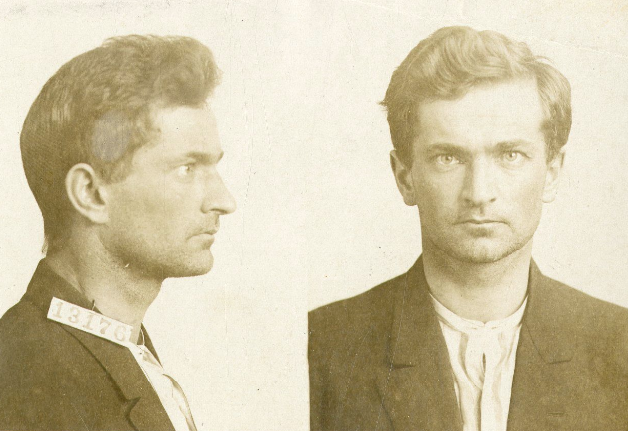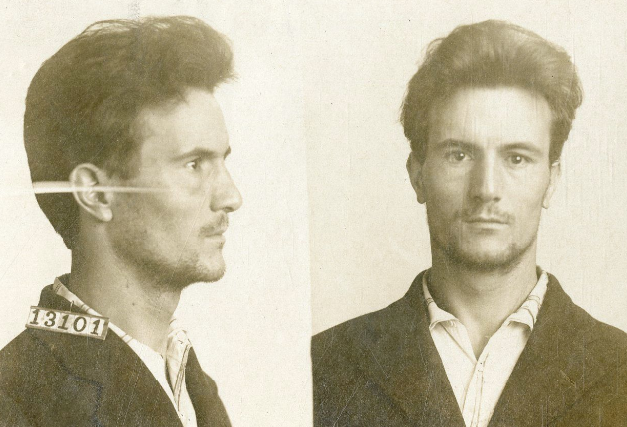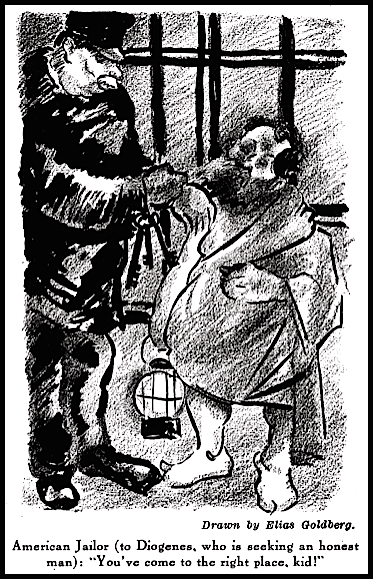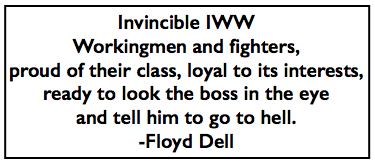 ———-
———-
Hellraisers Journal – Wednesday May 28, 1919
From Leavenworth Penitentiary Comes Urgent Request for Bail
From The New Solidarity of May 24, 1919:
BAIL URGENTLY NEEDED BY LEAVENWORTH MEN
[-by Fellow Workers Joseph J. Gordon and Pietro Nigra.]
—–
This communication explains the necessity of getting some of the Fellow Workers out of jail as early as possible.
Four Fellow workers, Walsh, Lorton, Hamilton and Plahn are in permanent isolation, segregated from the others and have no way of keeping in communication with the other boys. These boys are always in danger of violence from the officials and should be gotten out on bonds immediately.
Fellow Worker Perry is in the hospital with tuberculosis, has had several relapses. Has no one who can go his bonds. Also Andreytchine is tubercular but has funds. Several of the Fellow Workers of the one year men will be released about June 18, 1919. Those who will be held for deportation will be arrested upon their release from prison and will have to stay in jail until the disposition of the cases by the Appellate Court, which may be from six months to a year or two. If these men can be released on bonds of $1,000.00 the authorities will have to pay their transportation to their homes.
Jos. Gordon.
Pietro Nigra.
[Emphasis to last two paragraphs was in original. This has been removed and names of Fellow Workers emphasized instead.]
[Photograph added.]—————
Fellow Workers at Leavenworth,
-mentioned in/authors of article above:
FW Joseph J Gordon, #13122
FW Pietro Nigra, #13704
FW John Walsh, #13147
FW Burt Lorton, #13132
FW Ed Hamilton, #13128
FW Charles Plahn, #13176
FW George Andreychine, #13101
———-
From The Liberator of May 1919:
The Invincible I. W. W.
[by Floyd Dell]
SOMETIMES the look of a man or a place is more significant than a lot of statistical information. And the statistics about the number of I. W. W. members who have been arrested, and the months of their imprisnmcnt, seem to me to be rather beside the point, since I went into the I. W. W. headquarters the other day and talked to some of the men just released from Ellis Island. I had gone in there looking for the victims of our latest form of governmental tyranny. The statistics of their suffering seemed to me important. But I didn’t find any victims. Nothing like it! I never hope to see anything less like victims than that crowd there.
They had suffered, it is true-suffered all that flesh and blood can suffer from the brutality of an infuriated employing class. But they were not beaten men. They were men who could never be beaten. They were not a sorry crowd of persecuted unfortunates, just released by a lucky chance from prison and the doom of exile, and left stranded without money or decent clothes a thousand miles from home. They were something else and something very distinctly not to be pitied. They were, somehow, the winners-not the losers, of the late unpleasantness; not because they had got released from Ellis Island and were not going to be deported-that didn’t matter at all.
No, they were part of an organization that whether here in New York, or there on Ellis Island, or back in the filthy jails of the Northwest, or in the lumber camps and cities from which they came, was pushing the enemy back further and further every day. They were part of a great army which didn’t retreat-which could fight in a prison as well as in a forest or a town, and in England or Sweden or Russia or Scotland as well as here, and which never stopped fighting. These men carried with them, wore visibly, the sense of that invincible internationalism. These that I saw were simply a company of skirmishers-victorious skirmishers-resting, talking quietly of the next day’s work, and thinking of the Big Push to come…
The headquarters of the I. W. W. at 27 East Fourth street is a big bare room, severe as an early New England church. A blackboard on the wall set forth in neat white lettering like a text the declaration of the I. W. W. preamble:
The working class and the employing class have nothing in common. There can be no peace so long as hunger and want are found among millions of working people, and the few who make up the employing class have all the good things of life. Between these two classes a struggle must go on until the workers of the world organize as a class, take possession of the earth and the machinery of production, and abolish the wage system…
-and the announcement of a Sunday morning meeting.
Seated over by a window was an old but rugged man, reading. He read, not as the tired clerk reads his newspaper in the subway, or as a tramp reads in the public library on cold days, but as a student reads: the book he was reading was a volume on economics by Professor Ely. He was a lumberjack, and one of the released deportees.
Another came in, young and ruddy, a miner; he had been picked up in Colorado and had joined the “Red Special” at Chicago. The others-who came in one by one-were mostly from the lumber industry. And they all had about them a pioneer quality-the hard-handed, kindly, confident, quiet strength of those who are accustomed daily to put muscle and guts and everlasting patience into the job of conquering the wilderness. They were what one thinks of as “American” at its best-what that word meant while it still meant something, and when America took her fame from the free strength of her westward-cutting frontier edge.
These were men of that stamp-not the sort of men who would sink without a protest into the slavery of capitalism, believing what they were taught and trying to be Respectable. They were the other sort-workingmen and fighters, proud of their class, loyal to its interests, ready to look the boss in the eye and tell him to go to hell. But they had been ignorant of two things-just what was wrong, and just how to go about it to set it right. They learned these two things from the I. W. W. And then, in the lumber camps of the Northwest, as in every place where these teachings have reached, there was a new kind of strike.
They were talking about it, about the big lumber strike of two years ago.
[One of them said quietly:]
Before the strike, a lumberjack wasn’t a man. He was a lousy animal. Everywhere he went he carried his lousy blanket on his back; and everywhere he went he wore his “tin pants” and his “corks”-shoes with spikes in the soles to give him a footing on a slippery log. And when he went in town he saw signs in the store windows, “No corks allowed in here.” The only thing he could do in town was get drunk and be robbed of six months’ wages, and go back with his filthy blanket on his back to slave ten hours a day for six months more. We struck for an eight-hour day, and decent human conditions. And we won the strike. Now a lumberjack is a man. He has burned his lousy blankets, and made the company furnish him a decent place to sleep. Why, in some camps the men even have sheets to their beds, as if they were regular human beings! And when he goes to town he puts on ordinary human clothes and leaves his corks behind. And he feels like a man, for he has time after an eight-hour day to do some thinking.
A strike for human decency. How was it won?
By solidarity. When we learned that lesson we never forgot it. We went out together and we came back together. That’s what the lumber bosses couldn’t fight.
And then, of course, we learned some new tricks about striking. Ever hear of the “intermittent strike”? Well, we tried that. Our funds were getting low, so we decided to strike on the job. A bunch of us would go back to work. The bosses were glad to see us-thought we’d given up. And then-well, the rules and regulations aren’t usually observed very well when you’re at work. We observed ’em. It certainly did slow things up! Everything went wrong. And then, to finish, somebody would institute the eight-hour day by pulling the whistle two hours before quitting time. Naturally, everybody stopped work. The bosses had a fit and fired us. So we moved on to the next camp, and wired headquarters to send another bunch to the last place. It certainly worked. I never saw a more peaceful strike in my life than that one, and I’ve seen some strikes.
-This is, of course, the hellish theory of sabotage. Some people might call it studied efficiency. Certainly if a thing is worth doing it is worth doing well.
The point to be observed is that the I. W. W. taught the lumberjack-as it has taught others-to want to be free human beings. And it taught them that the way to achieve freedom is by solidarity. This was bad enough, from the point of view of the mill owner whose profits are being curtailed by an eight-hour day and the wholly unnecessary expense of beds, blankets, baths and reading rooms. (“What does a lumberjack want with baths and reading rooms?”)
But there was worse in prospect. These men were not content with their victory. They wanted the earth-quite literally. They wanted to keep on striking whenever the opportunity came, for more pay, for shorter hours, until there were no profits left. They wanted to run the lumber industry themselves. And this not as an idle dream, but as the announced program of men who had proved themselves the superior of their bosses in skill and wit and determination-who had learned how to win and were filled with the spirit of victory. What could be done about it? Obviously, they must be destroyed. The war-hysteria could be taken advantage of; the I. W. W. could be charged with being an organization maintained by German money; its members could be hounded, lynched, jailed and tortured to death.
And they were…. After a newspaper campaign charging the I. W. W. with every known crime, the roundup began. Every man known to be a member of the I. W. W. was arrested and thrown into jail. Their halls were raided, their papers seized, their books confiscated. But in spite of all these efforts, it was found impossible in many cases to frame up any kind of criminal charge against these men. They were kept in jail without any charge. Months dragged by and the jails were full. What to do with them? Legal processes were too slow and unsure. Some large method of disposal must be invented. And so it was decided to deport them. The law? That was easy; it could be construed that way-and if necessary amended. It was.
The procedure now took a form unknown in civilized nations up to the present time: The man was brought before an Immigration Inspector, who as prosecuting attorney asks him questions, as court stenographer records his answers, as jury considers the evidence, and as judge pronounces the verdict. Thus:
“Do you believe in assassination?”
“No.” “Do you believe in violence?”
“No.”
“Do you believe in the destruction of property?”
“No.”
“What! Do you mean to deny that you are a member of the I. W. W.?”
“Oh, I belong to the I. W. W. all right!”
(Immigration Inspector writes: “He admits that he belongs to an organization which teaches assassination, violence and the destruction of property.”)
“Where were you born?”
“In England, thirty years ago. I was brought here at the age of two.”
“Hm-m. I find that you were illegally admitted into this country as having been at the time of your admission likely to become a public charge; which is shown by your present views, these being such as would in all probability eventually bring you into conflict with the laws of our country, and hence, as a prisoner, as a public charge. Recommended for deportation.”
“But I haven’t committed any crime. I have never even been arrested!”
“That is all. Next!”
This is not a fancy sketch. It is as accurate a brief condensation as possible of the longer and more involved examination, and faithfully presents its spirit, method and results. (It is unnecessary to go into the question of the relations between the Immigration Inspectors and the mill owners, though the facts are sufficiently scandalous.)
Mass deportation; that is the employers’ method, acquiesced in by the United States authorities, of getting rid of the I. W. W. The result is all that is important; if the man carries a red card deport him-and if, as in some instances, he was born in this country, put the “burden of proof” on him and keep him locked up so that he can’t prove anything; if he has a wife and children born in America (for the cases include more than one of these) deport them all!
And the I. W. W.? They held meetings in jail, took in new members, and collected dues. At a time when Ole Hanson was forbidding the I. W. W. to hold meetings in Seattle, they held a business meeting in the city jail, and received fraternal congratulations from a score of Bolshevik sailors cooped up with them after a conflict of authority between their Soviet and the captain. They were fed on rotten food. They went on hunger strikes. They were put in solitary, beaten, drenched with icy water from a fire hose. They fell sick, and some of them died, others will never recover from the treatment.
But their spirit was unbroken. Offered parole on condition that they would abjure the I. W. W., they refused. They were transferred from jail to jail; they ran the gamut of American prison filth, starvation and brutality. During all this time they were still being held without a criminal charge against any of them. Then the war ended, there were transport facilities, and the men (in some cases after a whole year of imprisonment) were herded into a train and brought under guard to New York, to be shipped away to England, Russia, Poland, Denmark, Hungary….
The story of the efforts, at last partly successful, to secure a reopening of their cases, has been told in the newspapers; and owing chiefly to [Caroline A. Lowe and the other] attorneys, the release of some fourteen has so far been effected. But to the released men it is all part of the day’s work. If they had been sent to the foreign countries to which the government chose to say they belonged, they would have gone-and kept up the work. Here, they are busy collecting money to buy food and clothes for their fellow-workers still on Ellis Island; for the clothes furnished by the government after a year’s imprisonment are too flimsy to wear, and the food is too poor and scanty to live on. They are on the job outside, raising funds for the men inside.
And when that is finished? The government, after keeping them in jail for a year, now that it has set them free refuses to transport them back to the places they came from. “I have aright,” says Uncle Sam, “to lock you up for as long as I please for no crime, take you across the continent and turn you loose there; and I owe you no reparation nor indemnity for this injury.”
They are men of the Northwest, men of the great forests, and they cannot very well go to sewing buttons in a pants factory. They will have to get back there somehow; and they will. And they will go back on the job again-unbroken. They will take up the old struggle that shall not end until their historic mission is accomplished. They will go on creating a new society within the shell of the old.
“Aliens.” They are the kind of “aliens” who once made America the hope of the world. They are still helping to keep it from being the world’s despair…. Not Americans ? Well, they can teach us what Americans ought to be!
FLOYD DELL.
———-
[Emphasis and paragraph breaks added.]
~~~~~~~~~~~~~~~~~~~~~~
SOURCES
The New Solidarity
(Chicago, Illinois)
-May 24, 1919, page 4
https://www.sos.wa.gov/legacy/publicationsviewer/?title=New%20Solidarity&page=9&id=271
https://libcom.org/files/The%20New%20Solidarity%20(May%2024,%201919).pdf
The Liberator Internet Archive
https://www.marxists.org/history/usa/culture/pubs/liberator/
The Liberator
(New York, New York)
-May 1919
https://www.marxists.org/history/usa/culture/pubs/liberator/1919/05/v2n05-may-1919-liberator.pdf
IMAGES
American Jailor to Diogenes, Liberator p11, May 1919
https://www.marxists.org/history/usa/culture/pubs/liberator/1919/05/v2n05-may-1919-liberator.pdf
FW Joseph J Gordon, #13122
https://catalog.archives.gov/id/117703295
FW Pietro Nigra, #13704
https://catalog.archives.gov/id/117719759
Frank Little with Grover Perry, from Lbr Def, Aug 1926
(Taken before Aug 1, 1917, murder of FW Frank Little.)
https://www.marxists.org/history/usa/pubs/labordefender/1926/v01n08-aug-1926-LD.pdf
Note: Unable to locate prison photo for FW Grover H Perry, #13137. See prison file:
https://catalog.archives.gov/id/112062380
FW John Walsh, #13147
https://catalog.archives.gov/id/117703363
FW Burt Lorton, #13132
https://catalog.archives.gov/id/117703331
FW Ed Hamilton, #13128
https://catalog.archives.gov/id/117703317
FW Charles Plahn, #13176
https://catalog.archives.gov/id/117703433
FW George Andreychine, #13101
https://catalog.archives.gov/id/117703255
See also:
Names from Leavenworth Files
https://www.archives.gov/kansas-city/finding-aids/leavenworth-penitentiary
War-time Prosecutions and Mob Violence:
Involving the Rights of Free Speech, Free Press,
and Peaceful Assemblage
-from Apr 1, 1917 to Mar 1, 1919
National Civil Liberties Bureau, 1919
https://books.google.com/books?id=cZ5DAQAAMAAJ
From Part II. Criminal Prosecutions, IWW Chicago Convictions & Sentences, Aug 1918:
https://play.google.com/books/reader?id=cZ5DAQAAMAAJ&printsec=frontcover&pg=GBS.PA34
4. PROSECUTIONS SPECIFICALLY INVOLVING I. W. W. ACTIVITY.
a). Conspiracies to violate various federal statute
8/30/18. Chicago Ill.-[…..]
[Page 34: List of the One-Year Men:]
Fred Nelson, Walter Smith, Roy A. Brown, Ray Corder, Chas. Jacobsen, A. E. Soper, Geo. Hardy, Geo. Speed, R. J. Bobba, Chas. McWhirt, J. R. Baskett, Chas. Jacobs sentenced to one year;
Tag: Chicago IWW Class War Prisoners
https://weneverforget.org/tag/chicago-iww-class-war-prisoners/
Tag: Deportations of 1919
https://weneverforget.org/tag/deportations-of-1919/
Tag: Red Special of 1919
https://weneverforget.org/tag/red-special-of-1919/
Tag: Great Northwestern General Lumber Strike of 1917
https://weneverforget.org/tag/great-northwestern-general-lumber-strike-of-1917/
WE NEVER FORGET: Otto Schmidt who believed that “the working class should organize to better their conditions.”
Dec 2, 1918: Died in Spokane while being held for deportation.
~~~~~~~~~~~~~~~~~~~~~~~~~~~~~~~~~~~~~~~~~~~~~
Fifty Thousand Lumber Jacks – Joe Glazer

